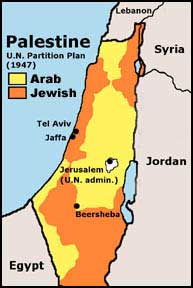
#1062
True Courage
There are many forms of courage:
Have the courage to ask people for help when you need it.
Have the courage to say, "I don't know."
Have the courage to ask questions when you don't understand something.
Have the courage to push forward even if you might make
mistakes.
Have the courage to do the will of our Creator.
(See Rabbi Pliskin's Gateway to Self Knowledge, pp.177-8)
17 Kislev

In
1947, the United Nations voted in favor of the partition of Palestine.
The Jewish area was split into three non-contiguous plots, with no
consideration of security: the eastern Galilee, the coastal plain from
Haifa down to Tel Aviv, and the majority being the uncultivable Negev
desert. The other half of the land was to form a new Arab state.
Jerusalem and its 100,000 Jews was to be completely surrounded on four
sides by the Arab state, and administered as an international zone.
Despite these unfavorable terms, the Jewish Agency immediately accepted
the Partition Plan; the Arabs immediately rejected it. Fighting began
soon after, leading to a full-scale assault in 1948 by troops from
Lebanon, Syria, Iraq, Egypt, Jordan, Saudi and Yemen.
17 Kislev
From all those who have taught me I have gained wisdom (Psalms 119:99).
The Psalmist is telling us that he learned from everyone, that
everyone was his teacher. From some, he learned what to do; from others,
what not to do.
If we learn from others' mistakes, we need not make our own.
Just as we can learn from every person, we can learn from every event.
Positive experiences are obvious sources of learning, because each
positive act we do adds to our character and prepares us to better face
the next challenge in life. Negative experiences can be valuable, too,
but only if we are sufficiently alert to learn from them.
The list of lessons that we have learned the hard way may be long, but
each one has taught us what not to do and thereby it becomes a positive
experience. Indeed, the Talmud states that when people sincerely regret
their mistakes and change themselves for the better, the wrongs that
they did become actual merits (Yoma 86b). Only when we fail to learn
from our mistakes and, rationalizing and justifying, obstinately insist
that we were right, do our misdeeds remain deficits.
We have the capacity to make life itself a tremendous learning and growth experience.
Today I shall ...
... try to look for lessons from everyone and everything, whether my teacher is positive or negative.



